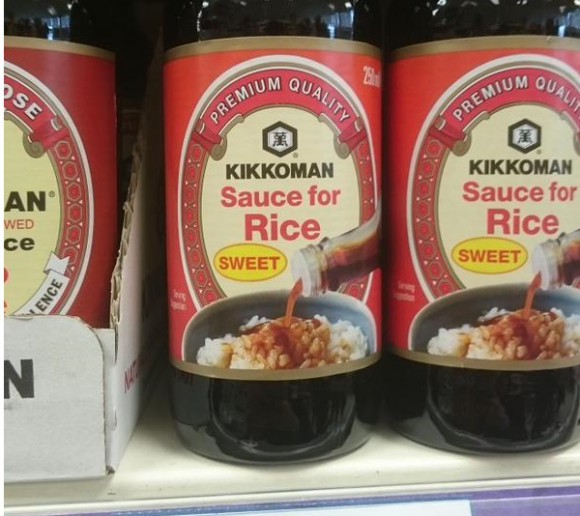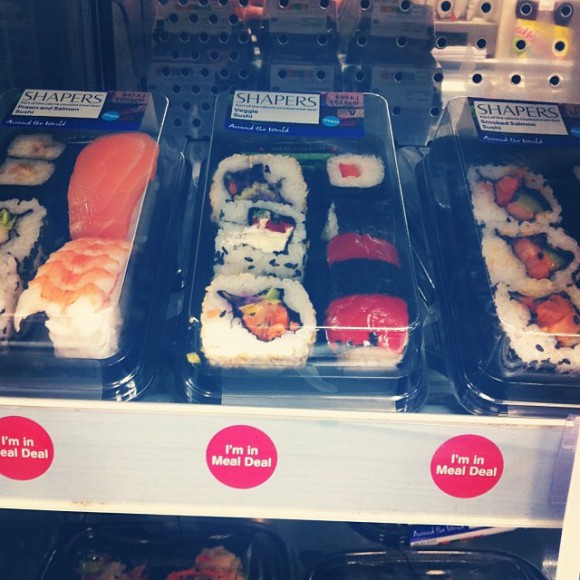
One of the first things that foreign visitors to Japan learn about Japanese cuisine is that white rice served by itself is meant to be enjoyed as it is, not soaked in soy or doused in dipping sauce. But many people who aren’t all that well-acquainted with Japanese food find the taste of plain boiled rice bland, and love to drizzle sweet and salty sauces all over in order to jazz it up a bit, even if it does make eating it with chopsticks ten times harder.
The UK is one place that probably isn’t known for having a high level of familiarity with Japanese food. Chains like Wagamama and Shoryu Ramen do exist, but they tend to play fast and loose with the definition of Japanese food, and as a result many British diners wind up getting their tastebuds in a bit of a tangle. But now, Japanese company Kikkoman is actually encouraging this desecrating behaviour by bringing out a new product in the UK market: Kikkoman Sweet Sauce for Rice! As you might expect, it’s raising eyebrows in Japan.
A Japanese tweeter recently posted a picture of a shop shelf in the UK which carries the product:
https://twitter.com/sheena_rat/status/647528357719097344“Foreigners seem to enjoy covering white rice in sauce, so Kikkoman have brought out a range of sauce to take advantage of that”, writes the tweeter, and this certainly seems like a savvy savoury move on Kikkoman’s part. In fact, most supermarkets in the UK usually have a tiny Japanese ingredients section which is almost always dominated by Kikkoman’s products, plus little boxes of sushi rice and nori seaweed so you can whip up sushi rolls at home. Gotta have all the basics, right?
Get your hands on our range of authentic #Japanese #ingredients, now on offer at @Sainsburys! pic.twitter.com/CEDZPGyy2P
— Yutaka (@YutakaEats) September 22, 2015
Sometimes, though, things just go badly wrong, like this “Japanese ramen” meal from British company Innocent, in which the noodles are actually udon…
Our new noodle pots are all £1 off in Tesco and save 1/3 in Sainsbury's right now http://t.co/5KqHcf9UlA pic.twitter.com/Tk9IBeonnu
— innocent drinks (@innocent) June 11, 2013
And this roasted red pepper sushi (although maybe Japan is a little late to the party on that front?).

However, it seems that Kikkoman is trying to encourage British shoppers to use the sauce in a variety of frankly weird ways. On the official European Kikkoman website, an explanation for the saucy product states:
“Our Sauce for rice adds a unique sweet-savoury flavour to all kinds of dishes, from meat and vegetables to soups and salads. It is perfect for the caramelisation of vegetables or nuts and it adds a special flavour nuance to Sunday roasts because just a few spoonfuls used as a marinade produce a beautifully crispy and incredibly delicious result. Sauce for rice even enriches the flavour of desserts such as chocolate mousse.”
Sunday roast? Chocolate mousse? Have you gone mad, Kikkoman?
Still, many Japanese commenters decided to go easy on the sauce, with some even expressing an interest in trying it out themselves:
“I didn’t know foreigners like to put soy sauce on rice. I’ve never seen it…”
“I actually really want to try this!”
“This is a yummy way to eat rice, which an American friend taught me about.”
“Foreigners don’t know to take a bite of white rice and then a side dish, so they think that white rice needs sauce mixed in.”
“It’s not that different to tamago-kake gohan, (raw egg and soy sauce mixed into hot rice) when you think about it.”
“Why is it sweet? Is it just soy sauce with sugar in it?”
“Soy sauce and butter on rice is yummy.”
We’ve been noticing a trend of late for Japanese netizens to enthusiastically construct disgusting food concoctions, so perhaps it’s better to take the opinions of Japanese Twitter users with a pinch of salt (and a dash of soy sauce). Traditional Japanese chefs would probably still balk at the idea of doctoring white rice. Still, perhaps in years to come “Saucy Rice” will be considered an essential British Japanese dish. After all, if the British hadn’t taken their own version of curry over to Japan, the Japanese curry rice we know today would never have been invented. And if American eaters didn’t have such an affinity for turning food inside out, we wouldn’t have California rolls! Perhaps we should embrace new food trends and the merging of different culinary cultures. After all, it’s all the same once it’s inside your stomach, anyway.
Source: Yukawa Net, Twitter/@sheena_rat
Main Image: Twitter/@sheena_rat

 Adorable Kikkoman ad from 1900s shows even a soy sauce company knew cats entertain
Adorable Kikkoman ad from 1900s shows even a soy sauce company knew cats entertain American Reddit post claims this soy sauce will change your life【Taste test】
American Reddit post claims this soy sauce will change your life【Taste test】 Can our Japanese writers guess what this pink soy sauce is by taste alone?【Video】
Can our Japanese writers guess what this pink soy sauce is by taste alone?【Video】 Chocolate to Put on Rice – The crazy condiment from Japan for when white rice is just too plain
Chocolate to Put on Rice – The crazy condiment from Japan for when white rice is just too plain The top 30 foods that go best with white rice, according to Japanese netizens
The top 30 foods that go best with white rice, according to Japanese netizens Japan Extreme Budget Travel! A trip from Tokyo to Izumo for just 30,000 yen [Part 2]
Japan Extreme Budget Travel! A trip from Tokyo to Izumo for just 30,000 yen [Part 2] Drift ice in Japan is a disappearing winter miracle you need to see now
Drift ice in Japan is a disappearing winter miracle you need to see now Starbucks Japan releases first-ever Hinamatsuri Girls’ Day Frappuccino
Starbucks Japan releases first-ever Hinamatsuri Girls’ Day Frappuccino Which convenience store onigiri rice balls are the most popular? Survey reveals surprising results
Which convenience store onigiri rice balls are the most popular? Survey reveals surprising results Can we be just like Shohei Ohtani on a budget with a Hello Kitty cap?
Can we be just like Shohei Ohtani on a budget with a Hello Kitty cap? Japan’s craziest burger chain takes menchi katsu to new extreme levels
Japan’s craziest burger chain takes menchi katsu to new extreme levels Japanese restaurant chain serves Dragon Ball donuts and Senzu Beans this spring
Japanese restaurant chain serves Dragon Ball donuts and Senzu Beans this spring The best Japanese cosplayers from Day 3 of Winter Comiket 2019【Photos】
The best Japanese cosplayers from Day 3 of Winter Comiket 2019【Photos】 Extreme Budget Travel! Can you do a trip to Manila with 50,000 yen (US$333)? – Part 2
Extreme Budget Travel! Can you do a trip to Manila with 50,000 yen (US$333)? – Part 2 Mysterious light-up rainy night-sound Totoro figure doesn’t actually show a scene from the anime
Mysterious light-up rainy night-sound Totoro figure doesn’t actually show a scene from the anime Highest Starbucks in Japan set to open this spring in the Tokyo sky
Highest Starbucks in Japan set to open this spring in the Tokyo sky Tokyo Skytree turns pink for the cherry blossom season
Tokyo Skytree turns pink for the cherry blossom season Yakuzen ramen restaurant in Tokyo is very different to a yakuza ramen restaurant
Yakuzen ramen restaurant in Tokyo is very different to a yakuza ramen restaurant Japan Extreme Budget Travel! A trip from Tokyo to Izumo for just 30,000 yen [Part 1]
Japan Extreme Budget Travel! A trip from Tokyo to Izumo for just 30,000 yen [Part 1] Japan has only one airport named after a samurai, so let’s check out Kochi Ryoma【Photos】
Japan has only one airport named after a samurai, so let’s check out Kochi Ryoma【Photos】 Japanese drugstore sells onigiri at pre-stupid era prices, but how do they compare to 7-Eleven?
Japanese drugstore sells onigiri at pre-stupid era prices, but how do they compare to 7-Eleven? Burning through cash just to throw things away tops list of headaches when moving house in Japan
Burning through cash just to throw things away tops list of headaches when moving house in Japan Starbucks Japan releases new sakura goods and drinkware for cherry blossom season 2026
Starbucks Japan releases new sakura goods and drinkware for cherry blossom season 2026 Japan’s newest Shinkansen has no seats…or passengers [Video]
Japan’s newest Shinkansen has no seats…or passengers [Video] Foreigners accounting for over 80 percent of off-course skiers needing rescue in Japan’s Hokkaido
Foreigners accounting for over 80 percent of off-course skiers needing rescue in Japan’s Hokkaido Super-salty pizza sends six kids to the hospital in Japan, linguistics blamed
Super-salty pizza sends six kids to the hospital in Japan, linguistics blamed Starbucks Japan unveils new sakura Frappuccino for cherry blossom season 2026
Starbucks Japan unveils new sakura Frappuccino for cherry blossom season 2026 Foreign tourists in Japan will get free Shinkansen tickets to promote regional tourism
Foreign tourists in Japan will get free Shinkansen tickets to promote regional tourism The 10 most annoying things foreign tourists do on Japanese trains, according to locals
The 10 most annoying things foreign tourists do on Japanese trains, according to locals Take a trip to Japan’s Dododo Land, the most irritating place on Earth
Take a trip to Japan’s Dododo Land, the most irritating place on Earth Naruto and Converse team up for new line of shinobi sneakers[Photos]
Naruto and Converse team up for new line of shinobi sneakers[Photos] Is China’s don’t-go-to-Japan warning affecting the lines at a popular Tokyo gyukatsu restaurant?
Is China’s don’t-go-to-Japan warning affecting the lines at a popular Tokyo gyukatsu restaurant? Survey asks foreign tourists what bothered them in Japan, more than half gave same answer
Survey asks foreign tourists what bothered them in Japan, more than half gave same answer Japan’s human washing machines will go on sale to general public, demos to be held in Tokyo
Japan’s human washing machines will go on sale to general public, demos to be held in Tokyo Starbucks Japan releases new drinkware and goods for Valentine’s Day
Starbucks Japan releases new drinkware and goods for Valentine’s Day We deeply regret going into this tunnel on our walk in the mountains of Japan
We deeply regret going into this tunnel on our walk in the mountains of Japan Studio Ghibli releases Kodama forest spirits from Princess Mononoke to light up your home
Studio Ghibli releases Kodama forest spirits from Princess Mononoke to light up your home Major Japanese hotel chain says reservations via overseas booking sites may not be valid
Major Japanese hotel chain says reservations via overseas booking sites may not be valid Put sesame oil in your coffee? Japanese maker says it’s the best way to start your day【Taste test】
Put sesame oil in your coffee? Japanese maker says it’s the best way to start your day【Taste test】 No more using real katana for tourism activities, Japan’s National Police Agency says
No more using real katana for tourism activities, Japan’s National Police Agency says Enjoy a refreshing bottle of just-kidding “soy sauce” from Japanese vending machines this summer
Enjoy a refreshing bottle of just-kidding “soy sauce” from Japanese vending machines this summer The pros and cons of using Fluffy Foam Soy Sauce【Taste test】
The pros and cons of using Fluffy Foam Soy Sauce【Taste test】 Trying some Umui sauces made only on a remote Japanese island with a population of 50【Taste test】
Trying some Umui sauces made only on a remote Japanese island with a population of 50【Taste test】 Spirited Away No Face soy sauce bottle and rice scoop will bring taste of Ghibli to your kitchen
Spirited Away No Face soy sauce bottle and rice scoop will bring taste of Ghibli to your kitchen “Powder Soy Sauce” is so much more than its name suggests【Taste test】
“Powder Soy Sauce” is so much more than its name suggests【Taste test】 Should you add wasabi to your soy sauce at a sushi restaurant?
Should you add wasabi to your soy sauce at a sushi restaurant? 5 common misconceptions most westerners have about Japanese food
5 common misconceptions most westerners have about Japanese food Japanese onsen hot spring comes with 99 types of soy sauce for visitors
Japanese onsen hot spring comes with 99 types of soy sauce for visitors Transparent soy sauce is a thing — we saw it, we tried it, we’re confused by it
Transparent soy sauce is a thing — we saw it, we tried it, we’re confused by it Rice cooker recipe: 7-Eleven Japan’s Miso Mackerel Butter Rice is as tasty as it is easy
Rice cooker recipe: 7-Eleven Japan’s Miso Mackerel Butter Rice is as tasty as it is easy Is it OK to put other food on top of your white rice when eating in Japan?
Is it OK to put other food on top of your white rice when eating in Japan? Celebrate your love for Japanese bento with new soy sauce fish bottle pens
Celebrate your love for Japanese bento with new soy sauce fish bottle pens Donuts with seaweed and soy sauce — Is Japan’s Mister Donut idea too Japanese for its own good?
Donuts with seaweed and soy sauce — Is Japan’s Mister Donut idea too Japanese for its own good? Tokyo has a “phantom egg shop” with ingredients for the best tamago-kake gohan rice bowl ever
Tokyo has a “phantom egg shop” with ingredients for the best tamago-kake gohan rice bowl ever Should you add tartar sauce to Japanese curry rice? CoCo Ichi makes diners an unusual offer
Should you add tartar sauce to Japanese curry rice? CoCo Ichi makes diners an unusual offer Five simple ways to take your curry rice to the next level
Five simple ways to take your curry rice to the next level